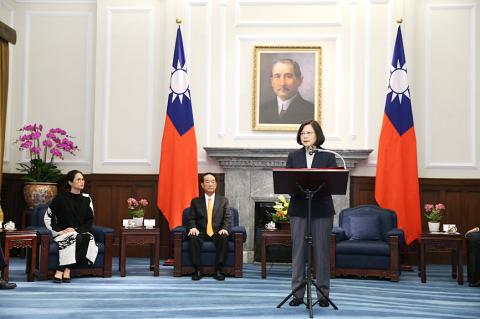President Tsai Ing-wen (蔡英文) yesterday said that Taiwan would show the world its ambition to be part of regional economic integration, as she hailed the significant progress made toward completing a Trans-Pacific Partnership (TPP) trade deal at last week’s APEC economic leaders’ meeting.
The progress made proved that promoting comprehensive economic and trade cooperation through dialogue and exchanges remains the common hope of all 11 nations involved in the TPP, Tsai said at a meeting with the Taiwanese delegation to the APEC summit.
Following the US’ withdrawal from the TPP, the remaining 11 nations, led by Japan, said on the sidelines of the APEC summit on Saturday that they had “agreed on the core elements” of the TPP, which is now officially called the Comprehensive and Progressive Agreement for Trans-Pacific Partnership.

Photo: CNA
The progress poses opportunities and challenges for Taiwan in its bid to join the TPP, Tsai said, adding that her administration would strive to show international partners in the region Taiwan’s desire to be part of regional economic integration by continuing to transform its industrial structure and improve business fundamentals.
Taiwan will seek out opportunities to make its voice heard in the world, continue to boost its international visibility and demonstrate what it can contribute to the international community, Tsai added.
Tsai’s envoy to the APEC summit, People First Party Chairman James Soong (宋楚瑜), said that the delegation did its utmost to ensure that the world heard Taiwan’s voice.
He said Taiwan shared its experience in the empowerment of women, the development of small and medium-sized enterprises, and its efforts to tackle climate change during the summit.
Tsai praised the delegation’s work at the summit held in the Vietnamese city of Da Nang.
She also praised Soong for helping leaders of other countries understand Taiwan’s key role in developing regional economic and trade links.
Tsai said Soong greatly helped advance the goals of the government’s New Southbound Policy through informal talks with nations that are the focus of the policy.
The policy is aimed at forging closer economic and trade ties with Southeast and South Asian nations, as well as New Zealand and Australia.
During the summit, Soong and other delegation members held bilateral or multilateral talks with leaders and representatives of APEC and ASEAN, including those from the US, Russia and Japan, Tsai said.
Taiwanese delegates also exchanged greetings with Chinese officials, she said.
Taiwan is determined to support the establishment of multilateral and regional free-trade agreements and enhance cooperation with countries in the region under the APEC framework, Tsai said.
After meeting with Tsai, Soong, in response to media queries, said that during his 30-minute meeting with Japanese Prime Minister Shinzo Abe on Sunday, Abe told him that all Asian nations share a common hope for regional peace.
However, when asked about the relationship between Taiwan and China, Abe did not give any suggestion on what Taiwan should do to address the cross-strait issue, Soong said.

Several Chinese Nationalist Party (KMT) officials including Chairman Eric Chu (朱立倫) are to be summoned for questioning and then transferred to prosecutors for holding an illegal assembly in Taipei last night, the Taipei Police said today. Chu and two others hosted an illegal assembly and are to be requested to explain their actions, the Taipei City Police Department's Zhongzheng (中正) First Precinct said, referring to a protest held after Huang Lu Chin-ju (黃呂錦茹), KMT Taipei's chapter director, and several other KMT staffers were questioned for alleged signature forgery in recall petitions against Democratic Progressive Party (DPP) legislators. Taipei prosecutors had filed

Taiwan would welcome the return of Honduras as a diplomatic ally if its next president decides to make such a move, Minister of Foreign Affairs Lin Chia-lung (林佳龍) said yesterday. “Of course, we would welcome Honduras if they want to restore diplomatic ties with Taiwan after their elections,” Lin said at a meeting of the legislature’s Foreign Affairs and National Defense Committee, when asked to comment on statements made by two of the three Honduran presidential candidates during the presidential campaign in the Central American country. Taiwan is paying close attention to the region as a whole in the wake of a

President William Lai (賴清德) has appointed former vice president Chen Chien-jen (陳建仁) to attend the late Pope Francis’ funeral at the Vatican City on Saturday on his behalf, the Ministry of Foreign Affairs said today. The Holy See announced Francis’ funeral would take place on Saturday at 10am in St Peter’s Square. The ministry expressed condolences over Francis’ passing and said that Chen would represent Taiwan at the funeral and offer condolences in person. Taiwan and the Vatican have a long-standing and close diplomatic relationship, the ministry said. Both sides agreed to have Chen represent Taiwan at the funeral, given his Catholic identity and

NEW WORLD: Taiwan is pursuing innovative approaches to international relations through economics, trade and values-based diplomacy, the foreign minister said Taiwan would implement a “three-chain strategy” that promotes democratic values in response to US tariffs, Minister of Foreign Affairs Lin Chia-lung (林佳龍) said. Taiwan would aim to create a “global democratic value chain,” seek to capitalize on its position within the first island chain and promote a “non-red supply chain,” Lin was quoted as saying in the ministry’s written report to the Legislative Yuan submitted ahead of the legislature’s Foreign Affairs and National Defense Committee meeting slated for today. The Ministry would also uphold a spirit of mutual beneficial collaboration, maintaining close communication and consultations with Washington to show that Taiwan-US cooperation